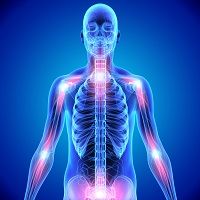Article
Stress Protein Also Worsens Chronic Pain
Author(s):
A group of drugs originally designed to treat mood disorders was found to also help alleviate physical pain.

A group of drugs originally designed to treat mood disorders was found to also help alleviate physical pain.
Researchers from the University College London (UCL) took an in-depth look at a protein which regulates stress, FKBP51. Previous research has linked the human FKBP5-like gene with the risk of developing major depression, post-traumatic stress disorder (PTSD), and other psychiatric disorders.
“The compound was designed to have positive effects on mental health, but we have discovered that it also has significant benefits from physical pain syndromes,” senior author Sandrine Géranton, from the UCL Research Department of Cell & Developmental Biology, said in a news release.
Those with variations of FKBP51 have also been reported to feel greater physical pain after serious trauma. Therefore, it would only make sense that those without this gene feel less pain — right? Well, the team examined mice who were genetically modified to lack FKBP5.
- MD Magazine’s One-Stop Shop for Pain Management News
“Inhibiting FKBP51 has a very powerful effect in mice with chronic pain. Not only does it block the pain from their injury without affecting their normal pain response, it also makes them more mobile. We did not find any negative side-effects,” explained lead author Maria Maiaru, from the same UCL department.
It turns out that the mice without FKBP51 had reduced chronic pain associated with nerve damage and arthritic joints, as described in Science Translational Medicine. Géranton said that the presence of this gene can make the pain worse, as well as prolong the stress response in the brain after a trauma.
A FKBP51-blocking compound called SAFit2 was developed by Felix Hausch from the Max Planck Institute of Psychiatry. It was designed to treat mood disorders such as anxiety; but when it was given to the mice, the researchers found that it relieved chronic pain.
“Who wouldn’t want a treatment that relieves chronic pain while also making you less stressed? This was an experimental study with mice, but if this could be successfully translated into a treatment for patients, it would be a win-win,” Géranton concluded.
Also on MD Magazine >>> Chronic Pain Rewires the Immune System




